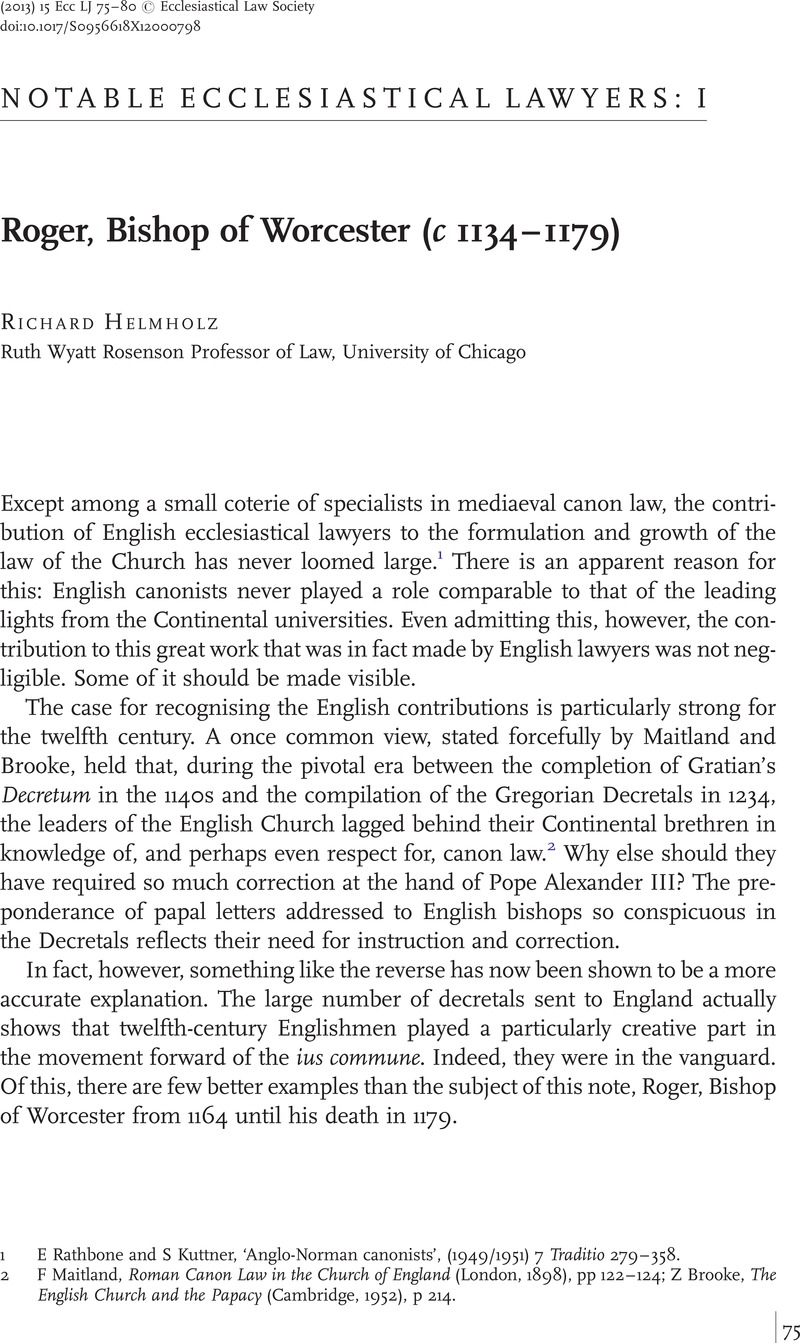No CrossRef data available.
Article contents
Roger, Bishop of Worcester (c 1134–1179)
Published online by Cambridge University Press: 13 December 2012
Abstract

- Type
- Notable English Ecclesiastical Lawyers: I
- Information
- Copyright
- Copyright © Ecclesiastical Law Society 2013
References
1 Rathbone, E and Kuttner, S, ‘Anglo-Norman canonists’, (1949/1951) 7 Traditio 279–358Google Scholar.
2 Maitland, F, Roman Canon Law in the Church of England (London, 1898), pp 122–124Google Scholar; Brooke, Z, The English Church and the Papacy (Cambridge, 1952), p 214Google Scholar.
3 Becket, T, I, Epistles, no 179, in Robertson, J and Sheppard, J Brigstocke (eds), Materials for the History of Thomas Becket, Rolls Series 67:5 (London, 1875–1885), p 345Google Scholar.
4 Morey, Eg A and Brooke, C (eds), Letters and Charters of Gilbert Foliot (Cambridge, 1967), p 190, no 145Google Scholar.
5 The most recent opinion on this subject holds that it would be ‘surprising’ and in fact ‘improbable’ to suppose that Roger had no formal legal training. See Cheney, M, Smith, D, Brooke, C and Hoskin, P (eds), English Episcopal Acta 33: Worcester 1062–1185, (Oxford, 2007), pp xlviii–xlixGoogle Scholar.
6 Cheney, M, ‘Roger (c.1134–1179), bishop of Worcester’, in Oxford Dictionary of National Biography (online edition, 2004–2012)Google Scholar.
7 See Wright, T (ed), The Anglo-Latin Satirical Poets and Epigrammatists of the Twelfth Century, Rolls Series 59:1 (London, 1872), p 198Google Scholar.
8 Cambrensis, Giraldus, Vita S. Remigii et Vita S. Hugonis, in Opera, ed Dimock, J, Rolls Series 21:7 (1877), p 57Google Scholar.
9 Letter No. 88 (1166), in Duggan, A (ed), Correspondence of Thomas Becket, vol 1 (Oxford, 2000), pp 356–357Google Scholar; the letter was coupled with a request amounting to a demand for aid in Becket's controversy with the king.
10 Cheney, M, Roger, Bishop of Worcester 1164–1179 (Oxford, 1980)Google Scholar.
11 Sayers, J, Papal Judges Delegate in the Province of Canterbury, 1198–1254 (Oxford, 1971), p 10Google Scholar. Other frequent judges delegate during this period were Gilbert Foliot, Bishop of Hereford and later Bishop of London, and Bartholomew, Bishop of Exeter.
12 Cheney, Roger of Worcester, pp 317–73.
13 See eg Henricus de Segusio (Hostiensis), Summa Aurea (Venice, 1574), book 1, De officio et potestate iudicis delegati, no 3.
14 Giraldus Cambrensis, Vita S. Remigii, p 345; perhaps he exaggerated, but the statement about Alexander's opinion of Roger cannot be entirely without substance. See also Knowles, D, The Episcopal Colleagues of Archbishop Thomas Becket (Cambridge, 1951), pp 22–23, 51–52Google Scholar.
15 Cheney, M, ‘Pope Alexander III and Roger, Bishop of Worcester, 1164–1179: the exchange of ideas’, in Kuttner, S (ed), Proceedings of the Fourth International Congress of Medieval Canon Law (Vatican City, 1976), p 227Google Scholar.
16 Gregorian Decretals, X 3.5.12. For an example of Roger's concern, see Acta, 33, no 229 (1164 x 1179), in Cheney et al, English Episcopal Acta, pp 154–155.
17 Gregorian Decretals, X 3.39.8.
18 Cheney ‘Pope Alexander III’, p 221.
19 Gregorian Decretals, X 2.14.5. The ins and outs of this process can be traced in Torquebiau, P, ‘Contumace’, in Naz, R (ed), Dictionnaire de droit canonique (Paris, 1935–1965), vol 4, pp 506–521Google Scholar; see generally Nörr, K, Romanisch-kanonisches Prozessrecht (Heidelberg, 2012), pp 72–77CrossRefGoogle Scholar.
20 Gregorian Decretals, X 2.28.11. The Pope here seems to have followed the Roman law on this point. See Cod 7.62.20.
21 Gregorian Decretals, X 2.28.1–73; Sext 2.15.1–12; Clem 2.12.1–7.
22 Cheney, Roger of Worcester, pp 197–206; Duggan, C, Twelfth-century Decretal Collections and their Importance in English History (London, 1963), pp 152–162Google Scholar; Mayr-Harting, H, ‘Master Silvester and the compilation of early English decretal collections’, (1965) 2 Studies in Church History 186–196CrossRefGoogle Scholar.
23 See Brundage, J, Medieval Canon Law (London and New York, 1995), pp 194–197Google Scholar.


